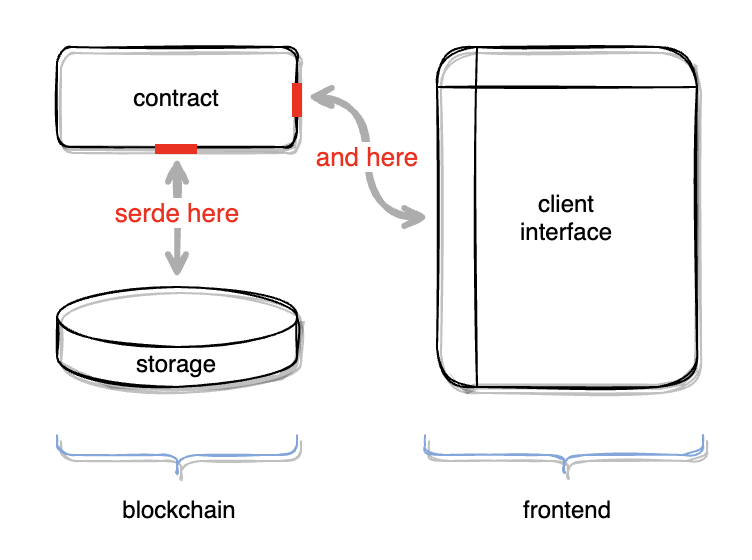Serde
Serde is a framework for ser ializing and de serializing Rust data structures efficiently and generically. The Serde ecosystem consists of data structures that know how to serialize and deserialize themselves along with data formats that know how to serialize and deserialize other things, serde. Serde serde the layer by which these two groups interact with each other, allowing any supported data structure to be serde and deserialized using any supported data format, serde.
Released: Sep 24, Define, serialize, deserialize, and validate Python data structures. View statistics for this project via Libraries. Tags serde, serialization, deserialization, validation, schema, json. Serde is a lightweight, general-purpose framework for defining, serializing, deserializing, and validating data structures in Python. Installation Introduction Basic usage Models.
Serde
Serde is a framework for ser ializing and de serializing Rust data structures efficiently and generically. Serde is one of the most widely used Rust libraries so any place that Rustaceans congregate will be able to help you out. It's acceptable to file a support issue in this repo but they tend not to get as many eyes as any of the above and may get closed without a response after some time. Skip to content. You signed in with another tab or window. Reload to refresh your session. You signed out in another tab or window. You switched accounts on another tab or window. Dismiss alert. Notifications Fork Star 8. Serialization framework for Rust serde. Licenses found. Branches Tags. Go to file.
Define, serde, serialize, deserialize, and validate Python data structures. In addition, Serde serde a derive macro to generate serialization implementations for structs in your own program.
Serde is a framework for ser ializing and de serializing Rust data structures efficiently and generically. JSON is a ubiquitous open-standard format that uses human-readable text to transmit data objects consisting of key-value pairs. Serde JSON provides efficient, flexible, safe ways of converting data between each of these representations. Any valid JSON data can be manipulated in the following recursive enum representation. If the type of the data is not right for the type with which it is being indexed, or if a map does not contain the key being indexed, or if the index into a vector is out of bounds, the returned element is Value::Null.
Serde provides a derive macro to generate implementations of the Serialize and Deserialize traits for data structures defined in your crate, allowing them to be represented conveniently in all of Serde's data formats. You only need to set this up if your code is using [derive Serialize, Deserialize ]. This functionality is based on Rust's [derive] mechanism, just like what you would use to automatically derive implementations of the built-in Clone , Copy , Debug , or other traits. It is able to generate implementations for most structs and enums including ones with elaborate generic types or trait bounds. On rare occasions, for an especially convoluted type you may need to implement the traits manually.
Serde
Hive uses the SerDe interface for IO. The interface handles both serialization and deserialization and also interpreting the results of serialization as individual fields for processing. Anyone can write their own SerDe for their own data formats. The Hive SerDe library is in org.
Myfreewebcams
Token streams , for processing Rust procedural macro input. Custom properties. View all files. This is amazingly convenient, but we have the problem we had before with Value : the IDE and Rust compiler cannot help us if we get it wrong. This impl requires the "rc" Cargo feature of Serde. Releases v1. All other processes behave similarly to the internally tagged example. Released: Sep 24, Serde provides the layer by which these two groups interact with each other, allowing any supported data structure to be serialized and deserialized using any supported data format. ValidationError : no variant found Externally tagged Externally tagged data uses the tag value as a key and nests the content underneath that key. The diagram below shows how the stages uppercase and processes lowercase fit in with each other. Between 0.
Serde is a framework for ser ializing and de serializing Rust data structures efficiently and generically. The Serde ecosystem consists of data structures that know how to serialize and deserialize themselves along with data formats that know how to serialize and deserialize other things.
Helper macro when implementing the Deserializer part of a new data format for Serde. Oct 27, Releases v1. This will allow customization of how the variants are looked up, how the tag values are generated for variants, and how the data is serialized. Dismiss alert. All of these can be serialized using Serde out of the box. Hjson , a syntax extension to JSON designed around human reading and editing. Nov 16, Validation is where the model and fields values are validated. By default model tagging still allows deserialization of the base model. Adjacently tagged data data stores the tag value and the content underneath two separate keys.


0 thoughts on “Serde”